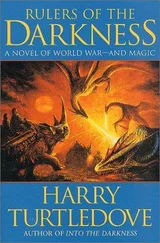Rathar spent another moment adjusting his tunic, then strode into the audience chamber. In the presence of the king of Unkerlant, his stern reserve crumbled. “Your Majesty!” he cried. “I rejoice to be allowed to come into your presence!” He cast himself down on his hands and knees, knocking his forehead against the strip of green carpet that led to the throne on which King Swemmel sat.
Any chair on which Swemmel sat was by definition a throne, since it contained the king’s fundament. This one, while gilded, was far less spectacular than the bejeweled magnificence of the one of the Grand Hall of Kings (Rathar reckoned that one insufferably gaudy, another secret he held close).
“Rise, Marshal,” Swemmel said. His voice was rather high and thin. Rathar got to his feet and honored the king yet again, this time with a low bow. Swemmel was in his late forties, a few years younger than his marshal. For an Unkerlanter’s, his features were long and lean and angular; his hairline, which retreated toward the crown of his head, accentuated that impression.
What hair he had left was dark—these days, probably dyed to stay so. But for that, he looked more like an Algarvian than a typical Unkerlanter. The first kings in Unkerlant, down in what was now the Duchy of Grelz, had been of Algarvic blood. Algarvic bandits, most likely, the marshal thought. But those dynasties were long extinct, often at one another’s hands. And Swemmel was an Unkerlanter through and through—he just didn’t look like one.
Rathar shook his head, clearing away irrelevancies. He couldn’t afford them, not dealing with his sovereign. “How may I serve you, your Majesty?” he asked.
Swemmel folded his arms across his chest. His robe was gorgeous with cloth-of-gold. Pearls and emeralds and rubies caught the light and winked at Rathar one after another as the king moved. “You know we have concluded a truce with Arpad of Gyongyos,” Swemmel said. The we was purely royal—the king had done it on his own.
“Aye, your Majesty, I know that,” Rathar said. Swemmel had fought a savage little war with the Gongs over territory that, in the marshal’s view, wasn’t worth having in the first place. He’d fought it with great determination, as if the rocks and ice in the far west, land only a mountain ape could love, were stuffed to bursting with rich farms and quicksilver mines. And then, after all the lives and treasure spent, he’d thrown over the war with no gains to speak of. Swemmel was a law unto himself.
He said, “We have found another employment for our soldiers, one that suits us better.”
“And that is, your Majesty?” Rathar asked cautiously. It might have been anything from starting another war to helping with the harvest to gathering seashells by the shore. With Swemmel, there was no way to tell beforehand.
“Gyongyos is far from the only realm that wronged us during our recent difficulties,” Swemmel said, adding with a scowl, “Had the nursemaids been efficient, Kyot would have known from birth we were the one destined for greatness. His destiny would have been the headsman’s axe either way, but he would have spared the kingdom much turmoil had he recognized it sooner.”
“Aye, your Majesty,” Rathar said. He had no way of knowing whether Swemmel or Kyot was the elder of the twins born to their mother. He’d joined the one army rather than the other because Swemmel’s impressers passed through his village before Kyot’s could get to it. He’d been an officer within months, and a colonel by the time the Twinkings War ended.
What would he be now, had Kyot dragged him into the fight instead? Dead, most likely, in one unpleasant way or another.
Again, he cleared might-have-beens from his mind. Dealing with what was gave him trouble aplenty. “Is it now your will, your Majesty, to turn our might against Zuwayza? The provocations along the border they have offered”—he knew perfectly well that Unkerlant had offered them, but saying so was not done—“give us every reason for punishing them, and—”
Swemmel made a sharp, chopping gesture. Rathar fell silent and bowed his head. He had misread the king, always dangerous to do. Swemmel said, “We can punish the Zuwayzin whenever we like, as we can resume the war with Gyongyos whenever we like. More efficient to strike where the opportunity will not come round again so soon. We aim to lay Forthweg low.”
“Ahh,” Rathar said, and nodded. No one could tell what Swemmel would come up with next. A lot of people had guessed wrong over the years. Not many of them were still breathing. Most of those who did survive were refugees. Anywhere within Unkerlant, Swemmel could—and did—reach.
Not all the king’s notions were good. That was Rathar’s private opinion. He remained safe because it remained private. But when Swemmel’s notions were good, they could be very good indeed.
Rathar’s smile had a predatory edge to it, as it often did. “What pretext shall we offer for stabbing the Forthwegians in the back?”
“Do you really think we need one? We hadn’t intended to bother,” Swemmel said indifferently. “Forthweg, or most of Forthweg, is our domain by right, and stolen away by rebels and traitors.”
Rathar said nothing. He raised an eyebrow and waited. Even such small disagreement with the king might mean his ruin. No one could tell what Swemmel would come up with—in anything.
In a testy voice, Swemmel said, “Oh, very well—if you like. You can dress up a couple of our men in Forthwegian frontier guards’ uniforms and have them blaze a couple of soldiers or inspectors in a border town. We don’t think it even remotely necessary, but if.you will, you may.”
“Thank you, your Majesty,” Rathar said. “Advancing a reason for war is customary, and the one you’ve given will do the job splendidly.” Rathar doubted he would have thought of anything so devious himself. Swemmel did have a gift for double-dealing. His marshal asked, “As we move forward against the Forthwegians”—Rathar had no doubt the Unkerlanters would move forward, not when they were hitting their new foes from behind and by surprise—“shall we move into land that belonged to Algarve before the Six Years’ War?”
“No.” Swemmel shook his head. “In no way do we intend to do that. We expect the Algarvians to take back their old dominions, and we do not wish to give them any excuse to attack our kingdom.”
“Very well, your Majesty,” Rathar said, not showing how relieved he was. This truly did look to be one of Swemmel’s good days, when the king was taking everything into account. Having fought the Algarvians in the Six Years’ War before his regiment had mutinied and he’d gone home, Rathar was less than eager to face the redheads again. He went on, “By the accounts of the battle outside Gozzo, the Algarvians are liable to be invading Forthweg any day themselves.”
“Even so,” King Swemmel said. “Nor do we judge that King Mezentio would halt his forces at the old frontier. Thus, if Unkerlant is to take back what is ours, we must move swiftly. King Mezentio, in our view, will not halt at anything, save where he is compelled.”
“Even by ley-line caravan, transferring our forces from the far western frontier to the border with Gyongyos will take some little while, your Majesty,” Rathar warned. He did not disagree with Swemmel about Mezentio—on the contrary—but did not believe his own sovereign knew where to stop, either: another opinion he held close. “Your Majesty’s wide domains prove your might, but they also make movement slower than it would be otherwise.”
“Waste not a moment.” Anticipation filled Swemmel’s laugh. “Curse us, but we wish we could be a mosquito in Penda’s throne room in Eoforwic, to see his face when he hears Forthweg is invaded from the west. They will have to clean a stain off the throne under him.”
Читать дальше












